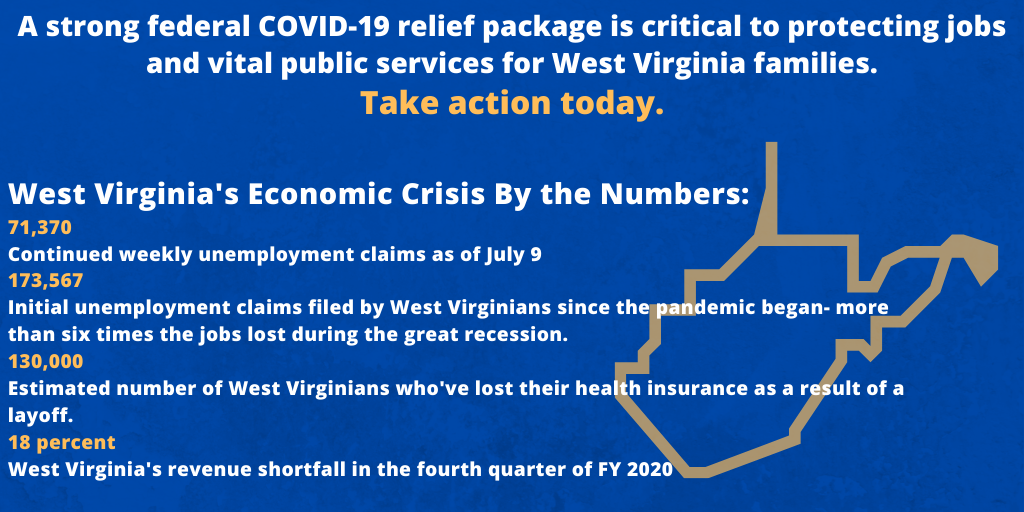This week, Governor Justice held a press conference to provide an update on the state’s fiscal situation at the start of the 2021 fiscal year (FY) and the ongoing impact of the COVID-19 pandemic.
According to the governor, West Virginia is starting FY 2021 with a $243.9 million surplus, and ended FY 2020 with a $23 million surplus, a sign that the state’s economy is strong despite the challenges of COVID-19. However, a closer look at the state’s revenue collections shows a weakening state economy that has been relying heavily on federal aid to stay afloat.
Rather than serve as proof of a strong economy, West Virginia’s revenue situation reveals a state that is struggling, one with more than 70,000 unemployed workers and growing housing and food insecurity, and one that has relied heavily on federal aid to make ends meet.
Read Sean’s full blog post.
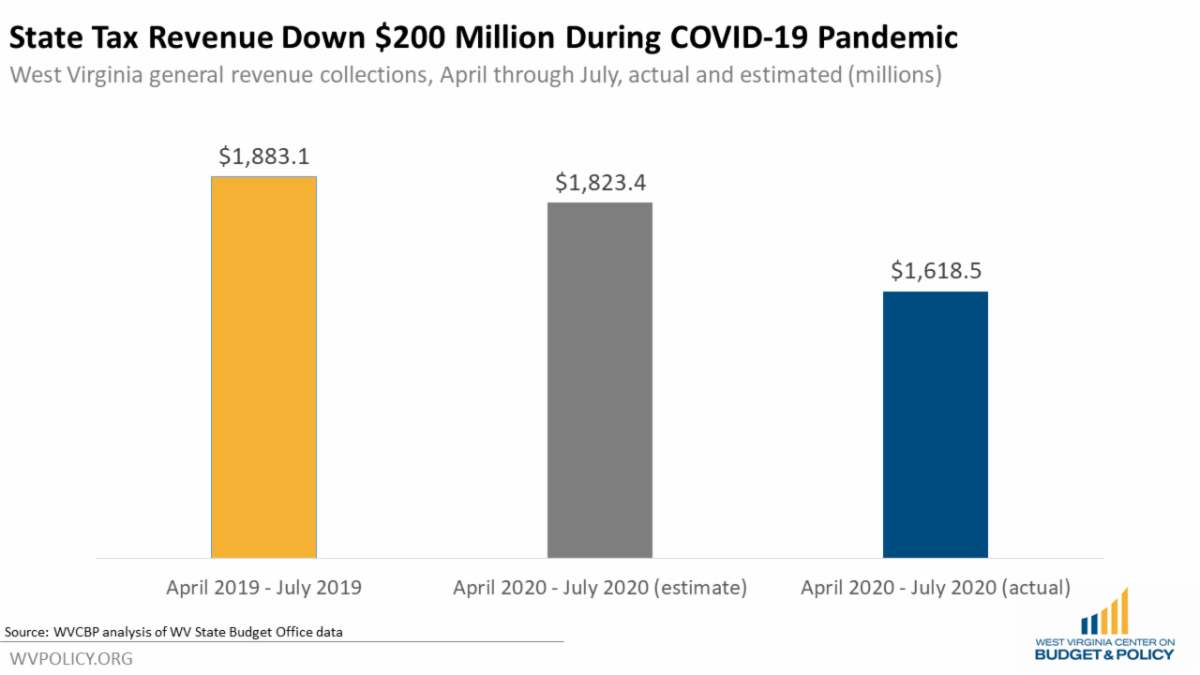
As the virus continues to spread, West Virginia is feeling the brunt of the COVID-19 health and economic crisis. Unemployment, hunger, and housing insecurity levels have spiked, resulting in hardship for thousands of families. What’s more, the state is on the brink of damaging layoffs and cuts to critical public services at the time they are needed most.
In the next federal relief package, Congress must step up to adequately address the pressing needs of our communities. The Senate-proposed HEALS Act fails to do so.
Read our full statement here.
Learn more about the shortcomings of the HEALS Act here.
Sign our petition urging Senators Manchin and Capito to protect the well-being of West Virginians here.
Download infographic PDF here.

A recent outbreak at Princeton Health Care Center, a nursing home in Mercer County, highlights once again the ongoing need for vigilant COVID-19 testing and contact tracing. Both of these efforts can be funded by using some of the $1.25 billion West Virginia received as part of the CARES Act passed in March.
Congregate settings such as nursing homes and incarceration facilities are particularly susceptible to COVID-19 outbreaks. These outbreaks endanger not only those confined within the facilities, but those living in the surrounding communities, as well.
Many local hospitals do not have the capacity to adequately respond to community outbreaks leading to surges in hospitalizations. In order to successfully relax community mitigation efforts like stay-at-home orders and other measures to reduce COVID-19 transmission while keeping communities safe and preventing hospitals from becoming overwhelmed, regular facility testing paired with robust contact tracing is necessary.
Read Seth’s full blog post.

The boosted unemployment insurance (UI) benefit of $600/week included in the CARES Act was incredibly effective at mitigating the pandemic-induced harm experienced by both individuals and the economy. However, despite unemployment levels that remain at record highs, the recently released HEALS Act looks to slash this enhanced UI system by $400/week.
The impact of this cut would be devastating to individuals’ well-being. Food and housing insecurity are steadily rising, and for many of those receiving unemployment benefits, the additional $600/week was critical for allowing them to put food on the table and keep a roof overhead.
What’s more, this reduction would significantly deter West Virginia’s economic recovery. Cutting the enhanced unemployment benefit from $600/week to $200/week would lower income in the state by $1.55 billion, costing the economy 15,000 jobs over the next year.
Learn more from the Economic Policy Institute’s blog post.
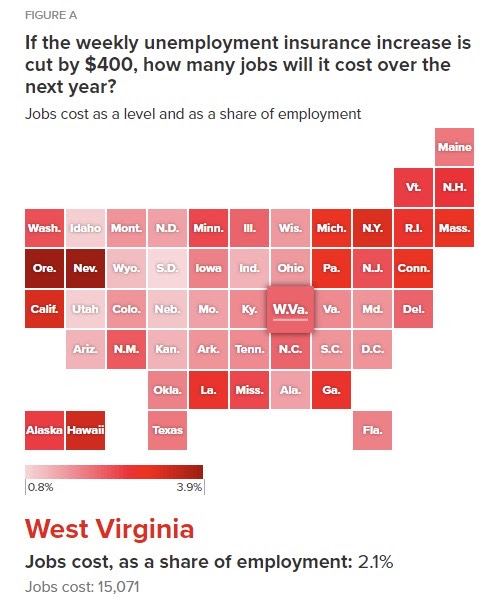
The Center on Budget and Policy Priorities released a report this week revealing that Medicaid serves as a critical source of health care coverage for our country’s essential and frontline workers. Many folks working in these essential industries do not receive employer-sponsored health coverage or cannot afford the associated premiums, and thus rely on Medicaid to remain insured.
Due to the pandemic, states nationwide are experiencing severe budget crises and are now faced with the difficult task of determining which programs will lose funding.
The report states:
“With states beginning to exhaust their options to avoid budget cuts, more states will likely make harmful Medicaid cuts unless federal policymakers provide additional Medicaid funds for them and maintain strong protections for Medicaid enrollees.”
The Senate-proposed HEALS Act includes no such provisions.
In West Virginia, 15% of all essential/front-line workers are enrolled in Medicaid and 41% of low-income essential/front-line workers are enrolled in Medicaid. These workers continue to put their health on the line as they help see our nation through the pandemic. Our government has the responsibility to ensure that they have ongoing quality health care coverage.
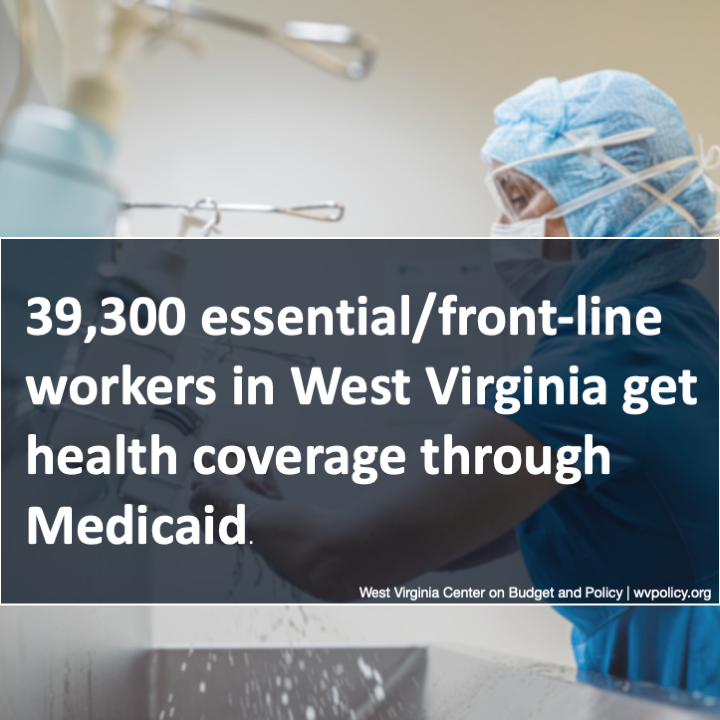
The Senate-proposed HEALS Act fails to include the much-needed 15 percent increase in the maximum SNAP benefit for all households. As Congress hits the final stages of negotiations for the next federal package, it is imperative that policymakers include this essential boost to SNAP.
The number of people struggling to put food on the table has increased dramatically as a result of the pandemic and recession, particularly in households with children.
SNAP is America’s most successful anti-hunger program. It has proven to be one of the most effective mechanisms available both to reach low-income households and to provide counter-cyclical help in recessions. The modest boost described above would help millions of American families, resulting in about $25 more per person per month.
Watch the video below to learn more about why SNAP matters now more than ever.

ReImagine Appalachia is a coalition whose mission is to create a future for the Ohio Valley that’s good for workers, communities, and the environment.
The group released its policy blueprint last month outlining how it plans to expand opportunity through public investments, build a 21st century sustainable Appalachia, and rebuild the middle class. The coalition framework was created by and for Appalachians, and we are excited to be a part of this innovative and ambitious new effort.
Take a moment to learn more about the coalition by viewing the video below.

West Virginia’s coal-impacted communities have been heavily burdened with economic, environmental, and public health problems as a result of the mining industry. The RECLAIM Act would release $1.6 billion from the Abandoned Mine Lands Fund to jumpstart the reclamation of mine land abandoned before 1976. In West Virginia, the RECLAIM Act would make available approximately $200 million over five years to support reclamation projects that would work to clean up our communities.
Urge your senators to pass the RECLAIM Act here.
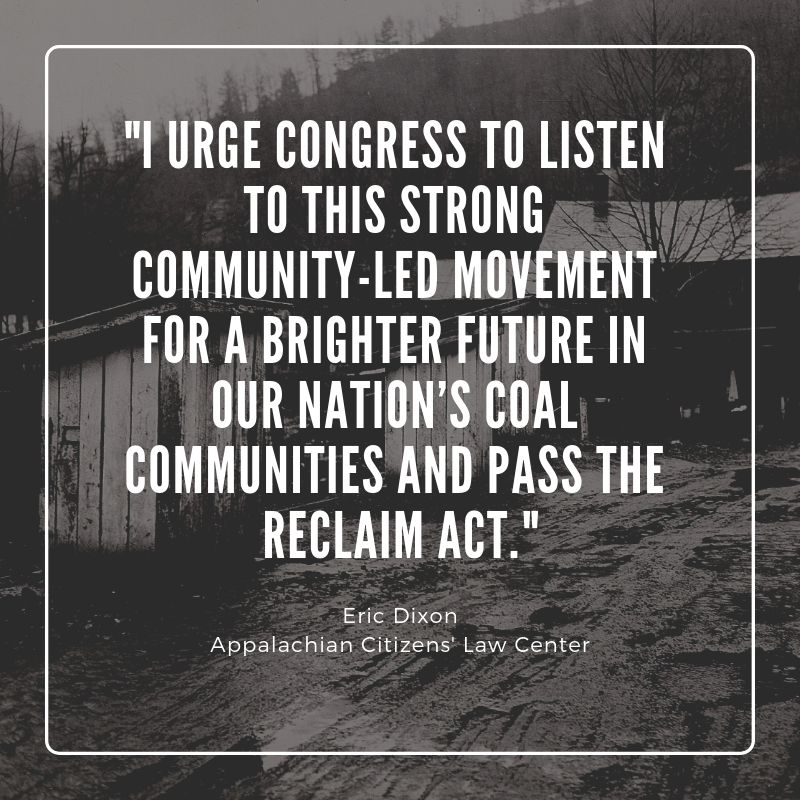
The US Senate is going to vote soon on COVID-19 relief. Time is running out for Congress to reach a bipartisan agreement that will give West Virginia families and our communities the help we need. What’s been proposed in the Senate isn’t good enough.
Urge Senators Manchin and Capito to help get West Virginia what we need to survive, recover, and thrive.
Sign the petition here.
